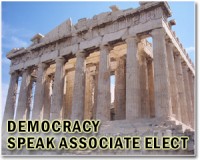| . |  |
. |
Sydney (AFP) June 24, 2010 Kevin Rudd was for years the darling of Australian politics before undergoing a decline as rapid as it was mysterious. Rudd, who stood down as prime minister Thursday to avoid a humiliating defeat in a party ballot, came from humble beginnings to lead the Labor Party and oust long-time conservative leader John Howard by a landslide in 2007. The fluent Mandarin speaker promised closer engagement with Asia and wowed voters with a landmark apology to Australia's Aborigines for their treatment under white rule. The assured, if bookish, leader unravelled Howard's harsh immigration policies and kept Australia recession-free throughout the financial crisis, something no other advanced economy achieved. With the opposition in disarray, Rudd consistently topped opinion polls in an enduring love affair with the Australian public, until the ardour suddenly cooled just months ago. "In a way it's gravity finally catching up with him but it's taken a very long time," crikey.com political writer Bernard Keane told AFP. "It's a bit like the fall of the Roman Empire: the question isn't so much why did it fall but why did it last as long as it did?" Rudd endured a tough childhood, forced to temporarily sleep in a car aged 11 when his family was evicted from their Queensland farm following his father's death in a road accident. He said that experience shaped the views on social justice that led him to run for federal parliament, where he was elected in 1998 on his second attempt. Before arriving in Canberra, he was a senior bureaucrat for the state Labor government in Queensland and had a lengthy career as a diplomat, including postings to Stockholm and Beijing. Married with three children, his wife Therese is a millionaire businesswoman in her own right -- a fact that plays well with female voters. Details of a drunken trip to a New York strip club in 2003 were also leaked to the media, although it backfired when Rudd's ratings rose with the shattering of his image as a "nerd". In November 2007, he and Julia Gillard, who replaced him as prime minister after a party coup, together brought the Labor Party back to power in a landslide after 12 years in the political wilderness. The start of Rudd's downfall can be traced back to December, when an attempt to pass vaunted emissions trading laws ended in embarrassing failure and a new opposition leader emerged, the pugnacious Tony Abbott. An immediate drop in the polls was compounded by a botched home insulation scheme which resulted in workers' deaths and a series of house fires. He then announced he had shelved plans for the carbon trading scheme aimed at slowing global warming, which he had branded the "greatest moral challenge of our generation," until 2013, a move that saw his public support plunge. His popularity was then further savaged by a very public dust-up with the powerful mining industry over plans for a new tax on resources profits, a tax which ultimately led to his political demise as his poll numbers plummeted. The 52-year-old showed a flash of his famous temper during one of his many appearances on national television, when he lambasted an interviewer for questioning his performance at the UN climate summit in Copenhagen. He was frequently criticised over the steady flow of asylum boats approaching Australia's shores and also accused of failing to achieve better ties with China, despite booming resources trade. But his government's 70 billion dollar (58 billion US) stimulus package can claim a large part of the credit for maintaining Australia's growth during the financial crisis, and spurring a strong recovery since. But while he may have enjoyed popularity with the public for two heady years, he struggled to win favour among his parliamentary peers -- even those from his own party. "Kevin Rudd has always been a very unpopular person in the parliament," former foreign minister Alexander Downer, who served under Liberal leader Howard, told Fairfax radio. "Popularity is not about whether you're are Liberal or Labor, you don't like people just because they are Liberal or Labor. "He was just not a person that people liked, because he was so self-centred and so self-interested."
Share This Article With Planet Earth
Related Links Democracy in the 21st century at TerraDaily.com
 Outside View: Summer of our discontent
Outside View: Summer of our discontentWashington (UPI) Jun 23, 2010 The U.S. political system was designed by the best minds of the 18th century. But today, the issues and crises of the 21st century are profoundly more complex, numerous and interrelated. To be sure, this system has changed with the times. However, when faced with an unprecedented multitude of simultaneous challenges and crises, most with difficult or indeed intractable solut ... read more |
|
| The content herein, unless otherwise known to be public domain, are Copyright 1995-2010 - SpaceDaily. AFP and UPI Wire Stories are copyright Agence France-Presse and United Press International. ESA Portal Reports are copyright European Space Agency. All NASA sourced material is public domain. Additional copyrights may apply in whole or part to other bona fide parties. Advertising does not imply endorsement,agreement or approval of any opinions, statements or information provided by SpaceDaily on any Web page published or hosted by SpaceDaily. Privacy Statement |